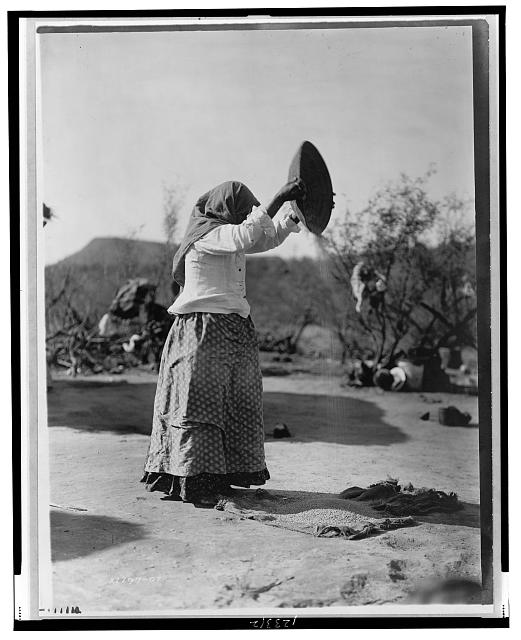Impact of European Contact
The arrival of the Spaniards ushered in profound changes for the O'odham. When Father Kino arrived in the late 17th century, the Apache were already pressing hard on the eastern limits of the O'odham territory. With the introduction of horses, Apache raids intensified and resulted in the elimination of the Sobaipuri people. For defensive purposes, the remaining O'odham soon abandoned their rancheria settlements and congregated into larger, more closely spaced, settlements. The increased Apache warfare also limited the distances that the O'odham people could travel safely, which curtailed their hunting and gathering activities.These changes in mobility and settlement patterns resulted in a greater dependency on agricultural products and a more formal political structure.
The introduction of wheat by the Spaniards further changed their lifeways. Because wheat is frost-resistant, it could be planted in the fall and harvested in the early spring before the planting of native crops. Thus, wheat essentially doubled their agricultural production and provided an important food source at a time of the year when stored foods were becoming exhausted. Finally, since wheat was more highly desired by the Spaniards than maize, it could be easily marketed. As the demand for wheat increased, more land was brought into cultivation and farming techniques increasingly shifted to irrigation, rather than floodwater, methods.
The O'odham were able to live relatively prosperous lives for several centuries. However, in the mid-19th century a drought hit. This, combined with dropping groundwater levels caused by the influx of Anglo settlers, made farming difficult. With the construction of dams upstream in the late 19th and early 20th century, the consequences were to become catastrophic. Rivers that were once irrigable became dry or deeply incised, and farming became nearly impossible. During the late 19th and early 20th centuries, thousands of O'odham starved to death and those that did survive were able to do so only by accepting food rations from the United States government.The consequences from this dark period in O'odham history continue to impact the people's health today.

O'odham woman winnowing wheat, ca. 1907
Source - http://www.loc.gov/pictures/item/00649911
Click on next page to continue.
